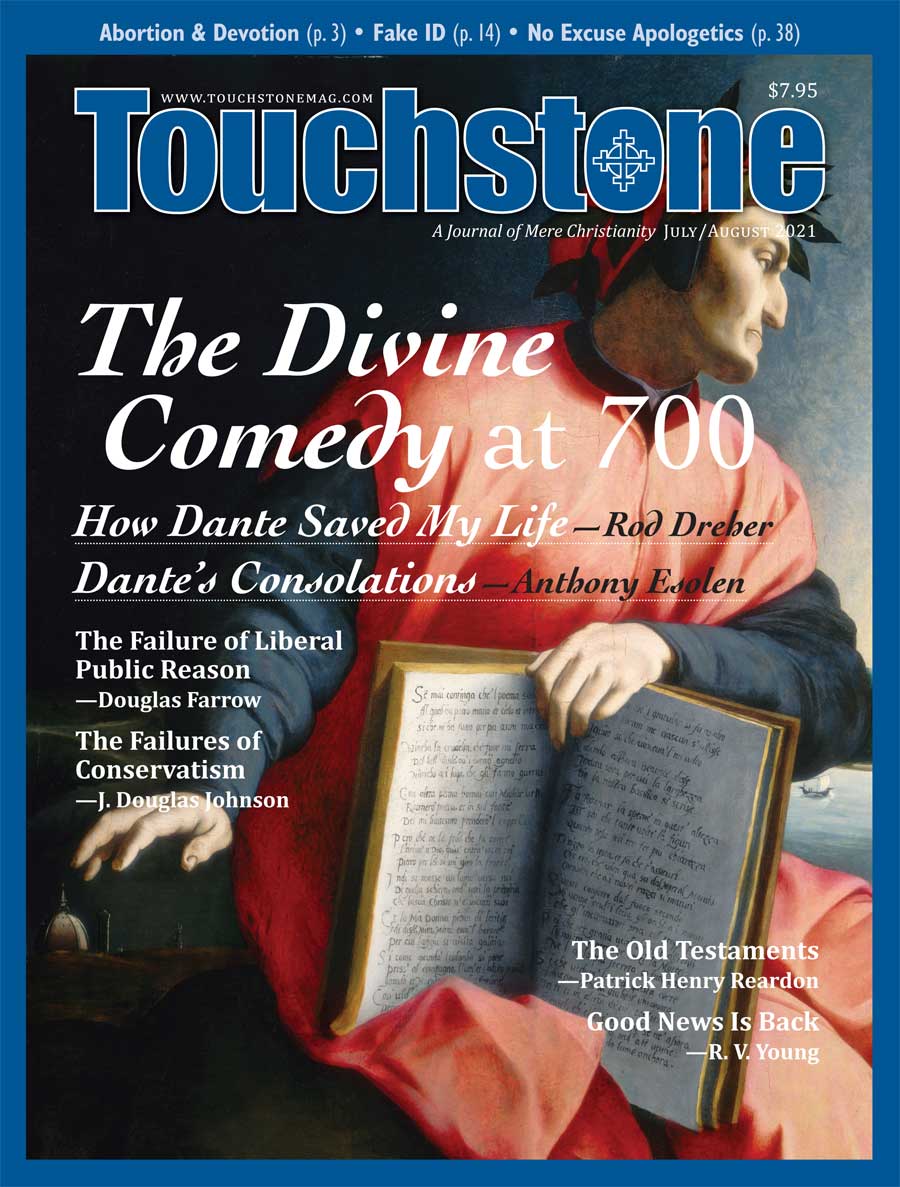By What Authority?
The Failure of Liberal Public Reason & How to Respond
Public reason, one might suppose, is simply moral or practical reason exercised collectively on matters pertaining to the common good. What ought we to do about this or that, where "this or that" is something that concerns us all?
• We do not wish to go hungry or naked: how shall we feed and clothe ourselves?
• We do not wish to be violated: how shall we keep the peace and defend ourselves?
• We wish to get better, to live the good life: how shall we improve ourselves?
The best answer to such questions may be very difficult to find or to achieve consensus on, and even harder to implement, but the burden of responsibility is laid upon us.
In the sphere of liberal democracy, European and American influences have combined to give rise to a new notion of public reason, which is now something more than practical reason exercised collectively on matters pertaining to the common good. New emphasis falls on "collectively," on the democratization of public reason, on the will of the people. But this will is no longer informed by a common tradition, upheld by the first two estates, the noble and the clerical, as it was in Christendom. We're all commoners now, but commoners who may not have much in common. How, then, do we mediate and rule our common life?
Liberal public reason thinks it has an answer. It stakes the claim, to quote Jonathan Quong in the Stanford Encyclopedia of Philosophy, that "the moral or political rules that regulate our common life [must] be, in some sense, justifiable or acceptable to all those persons over whom the rules purport to have authority." Which means that they cannot embody or appeal to what is not in common but only to what is in common.
So what is that? What is in common, it turns out, is that, as persons, we are all authorities to ourselves. The proponents of liberal public reason, the same author tells us, "often present the idea as an implication of a particular conception of persons as free and equal. Each of us is free in the sense of not being naturally subject to any other person's moral or political authority, and we are equally situated with respect to this freedom from the natural authority of others." Liberal public reason, in other words, acknowledges no natural authority but the authority of the self. And, we might say, of itself. For in liberal circles "public reason" doesn't even require the qualifier "liberal." Apparently, reason is a liberal invention. Who knew?
What does this mean in practice? A simple example would be same-sex marriage. One cannot appeal to the biblical notion of divine design for marriage, because not all are adherents of biblical religion, nor do all believe in God. Different people have different views of sex and marriage. All that can be said about such a subject, under the rules of liberal public reason, is that "freedom to love" and "equality in love" reflect our common values. Only a cleverly managed period of adjustment in public imaging is required to get from there to a change in the legal definition of marriage and, with that, to endorsement of a new standard for sexual morality; in brief, to the normalization of homosexuality and the de-normalization of most prior judgments about sexual behavior. Individuals or groups who do not make the requisite adjustments become targets for punitive sanctions, at first informally, then formally. That all of this has or may have a detrimental effect on the values of "freedom" and "love" and indeed on public cohesion is neither debated nor regarded as debatable.
Perhaps you have noticed that the argument is circular: We have a particular conception of persons free and equal and not naturally subject to any one else's authority. This leads to a particular idea of public reason, which entails not appealing to anything or advocating anything that might challenge our conception of persons as subject to no authority but their own.
Well, okay, but whence arises that view of the person? Do we share it? Should we share it? What does it do to our conception of the family, say, as a natural or pre-political institution with its own authority and authority structures? Or to the Church as a divine institution, again with its own authority and authority structures? These it privatizes, of course, and sets out to remove from the public sphere. But is it sufficiently robust, absent what families and religious communities bring to the table, to "provide solutions to all, or almost all, of the important moral and political questions we face"? If not, how shall we settle those?
Shared Perceptions of Reality
"Without a shared account of the world," concludes Quong, "it might seem the project of public reason faces grave difficulties. Even if certain moral or political rules can be publicly justified, our understanding and application of these rules might radically diverge given sufficient perspectival diversity regarding what the world looks like." In a globalized world, we may add, it is a very large body of people or peoples who will have to achieve sufficient perspectival unity to make the idea work, if the constituency is not to reduce to an oligarchy or even to one very strong man, who, like tyrants of old, declares that the reasoning public, C'est moi!
Quong remains optimistic, but put me down for a pessimist. Public reason, and public justification of its results, does not depend on shared "values" so much as on shared perceptions of reality that call for those values and commitments. Liberal public reason is a call for reasoning of the kind that can talk about "persons" but cannot say what a person is, or is for, except to say that a person is self-determining. And it cannot even say why or how a person is self-determining because that would carry it into the realm of controversy, which its idea of "public" is designed to exclude. Of course, it does not actually exclude it, except by suppression—suppression of those who understand persons and self-determination differently, and who therefore understand society and public reason differently. That is why the whole project of reconceiving public reason is showing itself to be impotent in the face of the culture wars.
Where it is not impotent, alas, is in its power to change, to undermine, even to cripple pre-political institutions such as church and family. Where the family is concerned, we are busy fulfilling Joseph Raz's prophecy (or was it a prescription?) in The Morality of Freedom. Recent changes, he wrote in 1988, "are uncertain and incomplete."
Some tendencies, e.g. to communal families, or open marriages, may wither away. Others, e.g. homosexual families, may be here to stay. It is too early to have a clear view of the consequences of these developments. But one thing can be said with certainty. They will not be confined to adding new options to the familiar heterosexual monogamous family. They will change the character of that family. If these changes take root in our culture then the familiar marriage relations will disappear. They will not disappear suddenly. Rather they will be transformed into a somewhat different social form, which responds to the fact that it is one of several forms of bonding, and that bonding itself is much more easily and commonly dissoluble. All these factors are already working their way into the constitutive conventions which determine what is appropriate and expected within a conventional marriage and transforming its significance.
Indeed. For they are all justified by the new morality of freedom from external authority, which in turn justifies itself by reference to what it calls "public reason," which doesn't admit of challenges. Something similar, we may safely assume, will be done with religious institutions.
The Higher Should Rule the Lower
Let us pause here to observe that it is a mistake to let the mid-level question control the upper-level question. Religion may or may not produce violence; nationalism may or may not produce violence. The family, for that matter, may or may not produce violence. But the need to defend ourselves from violence ought not to determine that the family or the nation or the religion of family or nation should have no place in public reason. Changing the parameters of public reason is not the solution to the problem of violence. It was Hobbes, of course, who sent us down that haunted trail in De Cive, and it is high time we exorcized the ghost of Hobbes. The need to feed ourselves cannot justify theft or violence against those who have what we do not. Likewise, the need to defend ourselves against violence cannot justify closing the public square to discourse about improving ourselves that depends upon religion or other robust world views.
Every attempt to do so is really an attempt to maintain or achieve hegemony for some particular world view. Catholics and Protestants have tried to do this, and they should not have; neither should the proponents of liberal public reason. But my point here is that the higher ought to rule the lower. We ought to improve ourselves by devoting ourselves to virtue, which is necessary for happiness; then, as those learning virtue, see to the defense of what requires defense; and so, preserve a space for feeding and clothing ourselves that is a properly human space. If the higher does not govern the lower, we are not on the path to happiness, which is what all men ultimately want; we are not living the good life, which is what practical reason, both public and private, aims at.
This methodological point made, two possibilities present themselves: Either liberal public reason is the product of cowardice respecting man's higher end, a retreat from higher things in a desperate attempt to guard lower things, or it is an opportunistic power grab by those who don't believe that man has a higher end. Both, I'm afraid, are in play. Either way, liberal public reason is destructive and tends to violence, not away from it. For if it is not permitted to say anything substantive about the good and about happiness, then it is also not permitted to identify and restrain moral failings. And a society that does not identify and restrain moral failings is not a society that makes men better. It is a society that encourages men to be worse.
Under the guidance of liberal public reason, we have backed ourselves into a corner, in which we are no longer able to think about moral failings in moral terms. Our now untrained moral intuitions have become just what Hume and Bentham and Nietzsche and Foucault, in their different ways, all said moral intuitions are: mere sentiments, sensations of appreciation or disgust, deployed as instruments of power; at best, aesthetic judgments, now largely untethered from a cosmos of goodness, truth, and beauty.
Moral chaos has ensued; social and legal chaos as well. Because we cannot talk of God, we cannot talk of man or of the created order in which man has been placed; that is, we cannot talk about what man is for, about the end of man, but only about what different men think they want as their own private means to happiness. Because we cannot talk about created order, we cannot talk about what is right but only about rights. We cannot talk objectively about dignity, only subjectively. We cannot talk about freedom except as autonomy, understood as freedom from the natural authority of others rather than as responsible self-government.
Autonomy no longer means even what Kant thought it meant, namely, to be subject to reason. Autonomy now means that I get to decide who and what I am, and when I will cease to be what I was, or cease to be at all. You do not contribute to that, except by your acquiescence to my decision. Even God does not contribute to that. The economy of gift and givenness, on which any functioning society depends, disappears. The reasonableness of reason disappears. The claims we make, and the policies and laws that we create, become untethered even from being itself, from objective reality, as I have tried to show in a very long essay on the subject in Theological Negotiations.
The Loss of the Body
Permit me to illustrate, by way of abortion. When we began pretending that the fetus was not a human being, rendering it legal to evacuate the body of the fetus from the mother's body even though that meant the deliberate killing of the fetus, we began (as Daniel Moody has pointed out) a general evacuation of the body itself from public reason and from our body of law. The mother's body still mattered and so did her "life project," but the fetus, on the grounds that it had no life project, was not even entitled to its body.
That's what happens, of course, when you refuse to take the Lord and Giver of life into account. If you are incapable of demonstrating that you have a life project, you simply don't count. If, on the other hand, you affirm that your project is over, or your attempt at it is over, then you do count to this extent—in many jurisdictions you may request help in doing away with your own body. For if you are no project of God's, you are nothing but your own project. Perhaps it won't be long before you are nothing but our project, the project of public reason. Huxley saw that one coming some time ago.
Are we surprised that, some fifty years on from the legalization of abortion, the law doesn't know what to do with the body even of the mother? The mother may now say that she is not a woman at all, that she intends to give birth, if she does give birth, as a man. Anyone may now say such things, and the law will recognize the claim as having legal force. (The media, for its part, will celebrate it as if it were a fact and not a preposterous legal fiction.) So the law ends up like the fetus: deprived of the body as its reference point, as its instrument, as its means of life.
There is nothing by which the law can now measure our claims except those claims themselves. So the law, like the mother or whomever has pushed for the abortion, becomes strictly self-referential. The law, too, becomes solipsistic, having deprived itself of the body which is our God-given means of social communication and organization. The law thus becomes increasingly arbitrary and irrational. Precedent matters less and less. Facts matter less and less. Non habeas corpus—let us not have the body, not even the body of law. Everything is to be invented anew all the time, since there is no created order and no actual givens with which we and it must deal. All rights become autonomy rights and anything that inhibits autonomy is bad. Family borders, religious borders, national borders fall—nay, are torn down. Even in the Church we seem to be witnessing something analogous: a deliberate tearing down of the deposit of faith and the discipline attached to it.
Now, Humanae vitae, which recently reached its fiftieth birthday, tried to resist the dismantling of the law of the body which was already taking place through contraceptive dismantling of the sexual act—through the sundering of the unitive and the procreative that in the creaturely order are, in periodic fashion, synchronous—and to do that without denying, indeed by reinforcing, the link between practical reason, with its responsibility to a hierarchy of goods both public and private, and responsible procreation.
Building on that, or rather clarifying its foundations, John Paul II's Veritatis splendor tried to resist the dismantling of moral reason itself: the prising apart of the body of the moral act, so to say, through the sundering of the intentionality of the act from the act's own obiectum or intrinsic ordering. "The rational ordering of the human act to the good, in its truth"—the objective dimension of morality—must not be bracketed off from "the voluntary pursuit of that good," the subjective dimension of morality, such that "discernment of conscience" comes to mean the determination of good and evil rather than recognition of the distinction between good and evil.
Had the lessons of these two encyclicals been received by more Catholics, a powerful cultural brake might have been applied against the slide into chaotic subjectivity that by 1968 was well under way. That slide, unfortunately, had already carried many Western Catholics into apostasy. They thought they were enjoying the good life and being good citizens, but in fact they were sharing in the loss of the good life and in the demise of the public sphere: loss of the good life, because the good life is the life that leads to happiness, which no life that ignores the designs of God does; loss of the public sphere, because no public sphere remains, once we have left the body behind and invested everything in the privacy of our minds.
Redeeming Public Reason
We have been speaking of the failure of liberal public reason. What can we say in conclusion about redeeming public reason? Redeeming public reason can only mean returning to the right order of reason. That means treating lower things as lower and—without prejudice to concentration on very narrow and specific problems at any level, for the sake of which that which is lower or higher, or even that which is alongside but only remotely so, may be bracketed out momentarily—never bracketing out the higher for any longer than is necessary.
If we continue to bracket out the higher as beyond the pale of public reason, public reason itself will become impractical and immoral to the point where we will be relieved of our efforts at pursuing it. The strong man will appear, the man St. Paul called "the man of lawlessness," who exalts himself against everything divine. "For the mystery of lawlessness is already at work," says Paul, and the strong man well on his way. Though he cannot be aborted or eliminated altogether—not until he has reached maturity and been confronted by Jesus Christ himself—it is our duty to resist him in our own time and place. It is our duty to confront the mystery of lawlessness he embodies with the victorious mystery of the gospel.
We Christians, then, have this burden laid upon us: We must do what we can to redeem public reason and put it to work in pursuit of the good life. My advice here is not very profound or very sophisticated. Rules, they say, are made to be broken. Well, they aren't, really, unless they are arbitrary and ill-founded. But the rules of liberal public reason are arbitrary and ill-founded. They are also destructive. So break them. Liberally. Speak of God in public. Speak of the right ordering of the human being, and of human life, in public. Don't do it piously, or apologetically. Do it graciously, but do it deliberately and systematically. Use reality-based nouns and pronouns. Challenge the cowardice and the contumely. Evangelize your neighbors, your congressmen, and, if need be, your judges. Sin boldly, as Luther would say.
Your opponents know how to do that. Do not underestimate them. And by "opponents" I do not mean merely those who—unreasonably, in my judgment, though perhaps with good intentions—defend and promote liberal public reason. I mean those who are taking advantage of it to erase all borders, pursuing with deadly determination the most socially deracinating proposals.
One thinks here of Shulamith Firestone, for example, who was born in Ottawa at the end of the Second World War and whose answer to the sexist raging of her soldier father was a radical Marxist-feminist program to eliminate sexual difference altogether, to uproot completely "the basic social organization, the biological family," to erase all boundaries of sexual behavior and to see to it that "genital differences between human beings would no longer matter culturally." How very far that astonishing, rage-driven program has succeeded! Even our primary schools are now teaching such things. Our universities and large corporations and political parties and international organizations are backing it. Our courts are blessing it. Meanwhile our children are suffering from it, even to the mutilation of their bodies. What began with dismemberment of fetuses in the womb continues with dismemberment of those who have survived the womb.
We must not mistake our situation. We are spiritually and culturally at war, a war that is rapidly becoming total war, whether we like it or not. And we cannot fight this war with one hand tied behind our backs, as the proponents of liberal public reason propose. Nor can we let our children be educated—rather, brainwashed—in this violence against God and against nature, against man and against reason itself.
Our present position is not much better than England's in 1939. The loss of the body is an "anticipatory sign" of our society's impending doom, if we do not act decisively and courageously. So cut the cords of false politeness. Cut also the cords of rage, for we do not fight with the Enemy's weapons. But fight we must, on the beaches and on the landing grounds, on the Hill and in the vale, wherever the Enemy launches his attacks. Yes, and in the Church also, for the Enemy against which we wrestle is most interested in the Church, which stands between him and his final objective.
So fight! And, by God's grace, never give up. •
This article is based on an address delivered at the John Paul II Institute in Washington in 2018, to a conference commemorating the anniversaries of Humanae vitae (1968) and Veritatis splendor (1993). The fruit of that conference will appear in The Body as Anticipatory Sign, ed. D. Crawford (CUA Press, 2021).
Douglas Farrow is Professor of Theology and Ethics at McGill University in Montreal. His recent books include Ascension Theology, Desiring a Better Country, Theological Negotiations, and 1 & 2 Thessalonians in the Brazos Theological Commentary on the Bible. He is a senior editor of Touchstone.
subscription options
Order
Print/Online Subscription

Get six issues (one year) of Touchstone PLUS full online access including pdf downloads for only $39.95. That's only $3.34 per month!
Order
Online Only
Subscription

Get a one-year full-access subscription to the Touchstone online archives for only $19.95. That's only $1.66 per month!
bulk subscriptions
Order Touchstone subscriptions in bulk and save $10 per sub! Each subscription includes 6 issues of Touchstone plus full online access to touchstonemag.com—including archives, videos, and pdf downloads of recent issues for only $29.95 each! Great for churches or study groups.
Transactions will be processed on a secure server.
more on liberalism from the online archives
more from the online archives
calling all readers
Please Donate
"There are magazines worth reading but few worth saving . . . Touchstone is just such a magazine."
—Alice von Hildebrand
"Here we do not concede one square millimeter of territory to falsehood, folly, contemporary sentimentality, or fashion. We speak the truth, and let God be our judge. . . . Touchstone is the one committedly Christian conservative journal."
—Anthony Esolen, Touchstone senior editor













